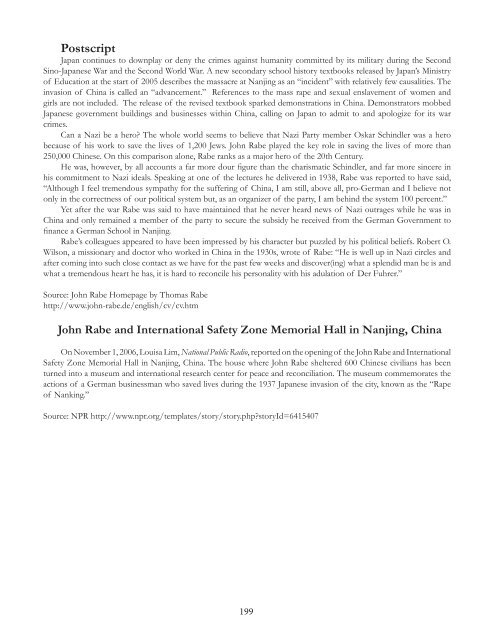Download - Canada ALPHA
Download - Canada ALPHA
Download - Canada ALPHA
Create successful ePaper yourself
Turn your PDF publications into a flip-book with our unique Google optimized e-Paper software.
Postscript<br />
Japan continues to downplay or deny the crimes against humanity committed by its military during the Second<br />
Sino-Japanese War and the Second World War. A new secondary school history textbooks released by Japan’s Ministry<br />
of Education at the start of 2005 describes the massacre at Nanjing as an “incident” with relatively few causalities. The<br />
invasion of China is called an “advancement.” References to the mass rape and sexual enslavement of women and<br />
girls are not included. The release of the revised textbook sparked demonstrations in China. Demonstrators mobbed<br />
Japanese government buildings and businesses within China, calling on Japan to admit to and apologize for its war<br />
crimes.<br />
Can a Nazi be a hero? The whole world seems to believe that Nazi Party member Oskar Schindler was a hero<br />
because of his work to save the lives of 1,200 Jews. John Rabe played the key role in saving the lives of more than<br />
250,000 Chinese. On this comparison alone, Rabe ranks as a major hero of the 20th Century.<br />
He was, however, by all accounts a far more dour fi gure than the charismatic Schindler, and far more sincere in<br />
his commitment to Nazi ideals. Speaking at one of the lectures he delivered in 1938, Rabe was reported to have said,<br />
“Although I feel tremendous sympathy for the suffering of China, I am still, above all, pro-German and I believe not<br />
only in the correctness of our political system but, as an organizer of the party, I am behind the system 100 percent.”<br />
Yet after the war Rabe was said to have maintained that he never heard news of Nazi outrages while he was in<br />
China and only remained a member of the party to secure the subsidy he received from the German Government to<br />
fi nance a German School in Nanjing.<br />
Rabe’s colleagues appeared to have been impressed by his character but puzzled by his political beliefs. Robert O.<br />
Wilson, a missionary and doctor who worked in China in the 1930s, wrote of Rabe: “He is well up in Nazi circles and<br />
after coming into such close contact as we have for the past few weeks and discover(ing) what a splendid man he is and<br />
what a tremendous heart he has, it is hard to reconcile his personality with his adulation of Der Fuhrer.”<br />
Source: John Rabe Homepage by Thomas Rabe<br />
http://www.john-rabe.de/english/cv/cv.htm<br />
John Rabe and International Safety Zone Memorial Hall in Nanjing, China<br />
On November 1, 2006, Louisa Lim, National Public Radio, reported on the opening of the John Rabe and International<br />
Safety Zone Memorial Hall in Nanjing, China. The house where John Rabe sheltered 600 Chinese civilians has been<br />
turned into a museum and international research center for peace and reconciliation. The museum commemorates the<br />
actions of a German businessman who saved lives during the 1937 Japanese invasion of the city, known as the “Rape<br />
of Nanking.”<br />
Source: NPR http://www.npr.org/templates/story/story.php?storyId=6415407<br />
199


